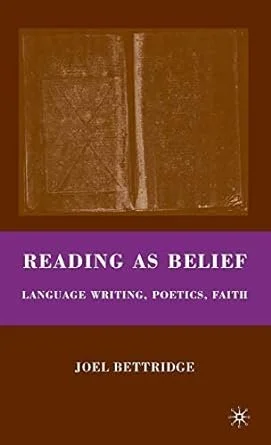Reading as Belief: Language Writing, Poetics, Faith
Palgrave, 2009
Reading as Belief advances the provocative idea that the disruptive techniques of recent innovative poetry require readers to become believers, occupying the same philosophical ground as the religious faithful. Pairing the poets Charles Bernstein and Bruce Andrews with John Calvin and Jonathan Edwards, and drawing on the work of diverse thinkers such as Wendy Brown, Ludwig Wittgenstein, Walter Benjamin, Stanley Cavell, William James, and Gilles Deleuze, this book demonstrates how belief, faith and language-attuned critical inquiry share an epistemology, one concerned with making meaning in the absence of certainty. Bettridge argues that recognizing such common ground helps overcome the cultural and philosophical impasse following the collapse of modernity's central narratives about language and liberal subjectivity.
"Bettridge's Reading as Belief is surprising, provocative, and engaging. On the surface of it, to link Charles Bernstein and Bruce Andrews to John Calvin and Jonathan Edwards, and to do so around issues of faith and poetics will strike most readers as quite peculiar. And that is precisely the heart of the book's attractiveness: providing us with a truly fresh perspective for considering the premises of experimental poetry and poetics as modes of faith. Bettridge asks us to consider the ethics of reading, instructing us to think about the relationship of poetics to faith. The result is a strange, wonderful book that points toward an ethics of engagement that applies equally to poetry and scripture and that leads us toward a mode of reading that links fully with the conduct of a life." — Hank Lazer
"Bettridge offers a dare. He dares you to read the notorious Language poets as if they professed a faith. What faith? A faith that creative readers, residing in the gap between words and the world, can constantly remake themselves and what they know." — Stephen Fredman
